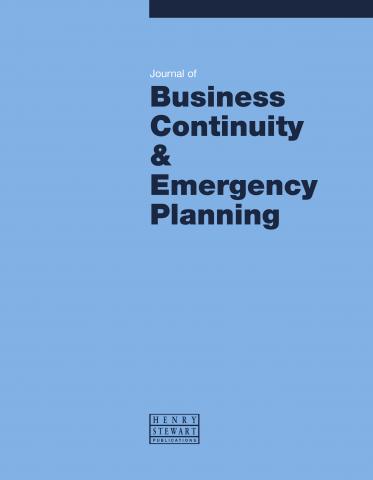"A cornucopia of stimulating thought pieces, making it a must read for anyone at the cutting edge of urban regeneration."
Volume 5 (2011-12)
Each volume of Journal of Business Continuity & Emergency Planning consists of four quarterly 100-page issues. The articles published in Volume 5 were:
Volume 5 Number 4
-
Making cities resilient: Increasing resilience to disasters at the local level
Paola Albrito, Head, Regional Office for Europe, UNISDR -
Measuring community resilience: A case study of coastal communities
Shesh Kanta Kafle, Disaster Risk Reduction, Canadian Red Cross -
Emergency and crisis management: Critical incident stress management for first responders and business organizations
Daniel H. Guenthner, Emergency Management Director, Lincoln County Emergency Management Office, Nebraska -
Business continuity management in emerging markets: The case of Jordan
Ihab H. Sawalha, Assistant Professor, Risk Management, American University of Madaba and John R. Anchor, Director, Emerging Markets Research Group, University of Huddersfield Business School -
Summary of the current operational epidemiological modeling landscape
Jeffrey Schlegelmilch, Manager, Emergency Management Services, Linda Bergonzi-King, Brienne Lenart, Emergency Management Analyst, Yale New Haven Center for Emergency Preparedness and Disaster Response, Debra Schnelle, Program Director, Theresa Lynn Difato, Program Director, Trifecta Solutions, Stewart Smith, President & CEO, Amanda Smith, EP+R International and Jody Wireman, Director, Force Health Protection, NORAD-U.S. Northern Command -
Estimating earthquake-induced failure probability and downtime of critical facilities
Keith Porter, Principal, SPA Risk and Kyle Ramer, Bridge Diagnostics -
Crisis management teams in health organizations
Deon Canyon, Associate Professor, Department of Public Health Sciences, University of Hawai’i at Manoa
Volume 5 Number 3
-
The cyber threat, trophy information and the fortress mentality
Tim Scully, CEO, stratsec and Head of Cyber Security, BAE Systems Australia -
Using Twitter and other social media platforms to provide situational awareness during an incident
Ed Tobias, Manager, Business Continuity and Disaster Planning, Associated Press -
Acceptance and utilization of the Incident Command System in first response and allied disciplines: An Ohio Study
Russ Decker, Director, Allen County Office of Homeland Security and Emergency Management, Ohio -
A disruption management model for emergencies
James McAlister, Business Continuity Coordinator, Merseyside Police -
The European cooperative approach to securing critical information infrastructure
Steve Purser, Head, Technical Competence Department, European Network and Information Security Agency (ENISA) -
Logistics modeling: Improving resource management and public information strategies in Florida
Daniel M. Walsh, Emergency Preparedness Specialist, Charles N. Van Groningen and Brian Craig, Decision and Information Sciences Division, Argonne National Laboratory -
How to deploy online guidance during a major incident
Sooria Balasegaram, Ishani Kar-Purkayastha, Neil Hough, Peter Sheridan, Mark Pownall, Robert Gent and Richard Barker, ISIS Web and Stakeholder Team, Health Protection Agency, Mary Bussell, Professor of Public Health, University of Surrey and Tim Burns -
A qualitative study of pandemic influenza preparedness among small and medium-sized businesses in New York City
Deron Burton, Medical Officer, U.S. Public Health Service, Evan Confield, Strategy Director, Virtue Worldwide, Mary Rose Gasner, Chief Privacy Officer and Deputy General Counsel and Isaac Weisfuse, Deputy Commissioner, Office of Emergency Preparedness and Response, New York City Department of Health and Mental Hygiene
Volume 5 Number 2
-
The European air traffic management response to volcanic ash crises: Towards institutionalized aviation crisis management
Jacques Dopagne, Director, Eurocontrol -
An integrated system for disaster preparedness and response
Dale Thompson, Threat Assessment Manager, Procurement & Supply Operations, Kaiser Permanente -
Encouraging resilience within SMEs: A proposed approach to improving business continuity
Stuart Sterling, Assistant Director, Corporate Resilience, Civil Contingencies Secretariat, Cabinet Office -
Resource allocation: An approach for enhancing hospital resiliency
Deborah Smith, James Paturas, Anthony Tomassoni, Yale New Haven Center for Emergency Preparedness and Disaster Response and Joseph Albanese, Yale University School of Medicine -
Managing burns patients in a mass casualty incident
Kathe Conlon, Burn Emergency Preparedness Education Coordinator and Shawn Martin, Saint Barnabas Health Care System -
Risk management in a university environment
Ann Brewer, Deputy Vice Chancellor, University of Sydney and Ian Walker, Director, MC2Pacific -
Strengthening infectious diseases surveillance in a Dutch-German cross-border area using a real-time information exchange system
Henriëtte ter Waarbeek, Consultant, Communicable Diseases, Christian Hoebe, Head, Department of Infectious Disease Control, South Limburg Public Health Service, Hermann Freund, Consultant, Communicable Disease, Verena Bochat, Consultant, Communicable Disease, Aachen Public Health Service and Chakib Kara-Zaïtr, Independent Consultant
Volume 5 Number 1
-
Can business impact analysis play a meaningful role in planning a cost saving program?
Trevor Wright, Emergency Planning Officer, North Yorkshire County Council -
The social media manifesto: A comprehensive review of the impact of social media on emergency management
Adam Crowe, Assistant Director, Community Preparedness, Johnson County Emergency Management & Homeland Security -
The world of standards: Order or anarchy?
Andrew Mason, Head of Business Continuity, PricewaterhouseCoopers -
Mortuary provision in emergencies causing mass fatalities
Andrew Elliott, Policy Advisor, Scottish Resilience and Noel Rehfisch, Head, Community Resilience Unit, Scottish Government -
New realities in school safety and preparedness
Bob Hull, Director, Kansas Center for Safe and Prepared Schools
Special feature on preparedness for the London 2012 Olympics
-
Exercise TIGER: Simulating the impact of the 2012 Olympics on Canary Wharf
Jon Evett, Business Continuity Manager, Canary Wharf Group -
How local authority services may be affected during the 2012 Olympics - and how they can be maintained
Kevin Smith, Business Continuity Manager, Surrey County Council -
A resilient NHS for London 2012
Andy Wapling, Head of Emergency Preparedness and Tom Mooney, NHS 2012 Health Resilience Project Manager, NHS London


